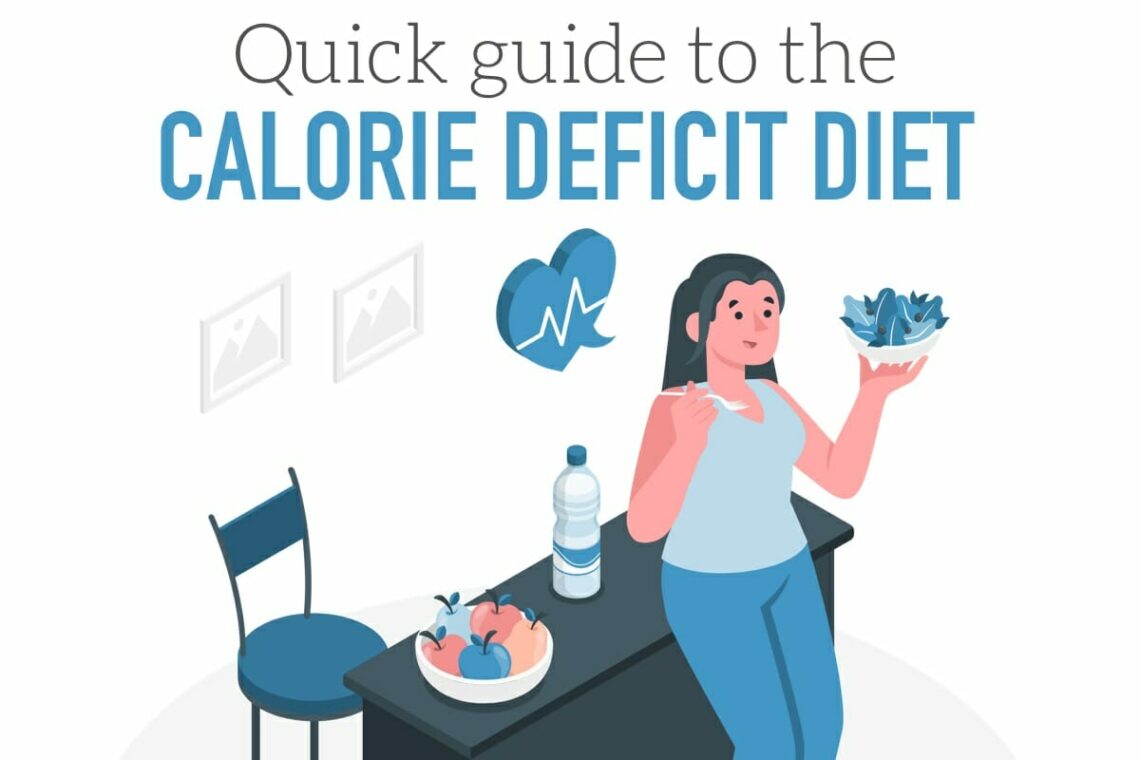Understanding Calorie Deficits
What Is a Calorie Deficit?
A calorie deficit occurs when you consume fewer calories than your body expends over a given period, resulting in a net reduction of energy intake. This energy shortfall prompts your body to tap into stored fat reserves for fuel, leading to weight loss over time. Calorie deficits are a fundamental principle of weight loss, as they create the necessary energy imbalance for shedding excess body fat.
How Is a Calorie Deficit Calculated?
To calculate a calorie deficit, you first need to determine your total daily energy expenditure (TDEE), which represents the total number of calories your body burns in a day through various activities, including basal metabolic rate (BMR), physical activity, and digestion. Once you know your TDEE, you can create a calorie deficit by consuming fewer calories than your TDEE, typically by reducing food intake and/or increasing physical activity levels.
Benefits of Calorie Deficits
Weight Loss
The primary benefit of a calorie deficit is weight loss. By consistently consuming fewer calories than your body needs, you create the conditions for burning stored fat reserves, leading to gradual and sustainable weight loss over time. This can help reduce body fat percentage, improve body composition, and enhance overall health and fitness.
Improved Metabolic Health
In addition to promoting weight loss, calorie deficits can have positive effects on metabolic health, including improvements in insulin sensitivity, blood sugar control, cholesterol levels, and blood pressure. By reducing excess body fat and promoting a healthy balance of energy intake and expenditure, calorie deficits can support metabolic function and reduce the risk of chronic diseases such as type 2 diabetes and heart disease.
Increased Energy and Vitality
Some individuals may experience increased energy levels and vitality when following a calorie deficit, particularly if they prioritize nutrient-dense foods and engage in regular physical activity. As excess body fat is burned for fuel, energy levels may improve, and overall well-being may be enhanced, leading to a greater sense of vitality and vitality.
Risks and Considerations
Potential Nutrient Deficiencies
One potential risk of calorie deficits is the inadequate intake of essential nutrients, including vitamins, minerals, protein, and healthy fats. Severely restricting calorie intake or following unbalanced diets can increase the risk of nutrient deficiencies, which may negatively impact overall health and well-being. It’s essential to prioritize nutrient-dense foods and ensure a well-rounded diet to meet your body’s nutritional needs while in a calorie deficit.
Muscle Loss
In some cases, calorie deficits may lead to muscle loss, especially if the deficit is too severe or if adequate protein intake and resistance training are not prioritized. To minimize muscle loss during weight loss, it’s crucial to consume sufficient protein, engage in regular strength training exercises, and avoid excessively low-calorie diets that can impair muscle maintenance and recovery.
Slowed Metabolism
Prolonged periods of calorie restriction may lead to adaptive changes in metabolic rate, including a slowing of metabolism known as adaptive thermogenesis. This metabolic adaptation can occur as the body attempts to conserve energy in response to reduced calorie intake, making it more challenging to continue losing weight over time. To mitigate metabolic slowdown, it’s essential to incorporate periodic breaks from calorie deficits, known as diet breaks or maintenance phases, to give the body a chance to reset and prevent metabolic adaptation.
Implementing a Healthy Calorie Deficit
Calculate Your TDEE
Start by determining your total daily energy expenditure (TDEE) using an online calculator or formulas based on factors such as age, gender, weight, height, and activity level. Your TDEE represents the number of calories your body needs to maintain its current weight.
Set Realistic Goals
Set realistic and sustainable weight loss goals based on your desired rate of progress and overall health and well-being. Aim for gradual weight loss of 0.5 to 1 pound per week, which typically requires a calorie deficit of 500 to 1000 calories per day.
Track Your Food Intake
Track your food intake using a food diary, mobile app, or online tool to monitor your calorie intake and ensure you’re staying within your target deficit. Pay attention to portion sizes, food choices, and macronutrient balance to optimize nutrition while in a calorie deficit.
Prioritize Nutrient-Dense Foods
Focus on consuming nutrient-dense foods that provide essential vitamins, minerals, fiber, and antioxidants while keeping calories in check. Include plenty of fruits, vegetables, whole grains, lean proteins, and healthy fats in your diet to support overall health and well-being.
Stay Hydrated
Drink plenty of water throughout the day to stay hydrated and support metabolic function. Water is essential for digestion, nutrient absorption, and cellular function, and adequate hydration can help curb appetite and prevent overeating.
Incorporate Physical Activity
In addition to reducing calorie intake, incorporate regular physical activity into your routine to further enhance calorie expenditure and support weight loss. Aim for a combination of cardiovascular exercise, strength training, and flexibility exercises to promote overall fitness and health.
Listen to Your Body
Pay attention to hunger and fullness cues, and listen to your body’s signals regarding hunger, satiety, and energy levels. Avoid overly restrictive diets or ignoring hunger cues, as this can lead to disordered eating patterns and undermine long-term success.
FAQs About Calorie Deficits
How much of a calorie deficit is healthy?
A healthy calorie deficit is typically in the range of 500 to 1000 calories per day, leading to a gradual and sustainable weight loss of 0.5 to 1 pound per week. Extreme calorie deficits should be avoided, as they can increase the risk of nutrient deficiencies, muscle loss, and metabolic slowdown.
How do I know if I’m in a calorie deficit?
You can determine if you’re in a calorie deficit by tracking your food intake and comparing it to your total daily energy expenditure (TDEE). If you consistently consume fewer calories than your TDEE, you’re in a calorie deficit and are likely to lose weight over time.
How long should I stay in a calorie deficit?
The duration of time spent in a calorie deficit depends on individual goals, preferences, and overall health status. Some individuals may choose to cycle periods of calorie deficits with maintenance phases to prevent metabolic adaptation and maintain long-term adherence. It’s essential to prioritize sustainability and avoid overly restrictive diets for extended periods.
Can I lose weight without a calorie deficit?
No, weight loss fundamentally requires a calorie deficit, as it creates the necessary energy imbalance for burning stored fat reserves. While other factors such as macronutrient balance, meal timing, and food quality can influence weight loss, a calorie deficit is essential for achieving meaningful and sustainable results.
Can I create a calorie deficit through exercise alone?
While exercise can contribute to calorie expenditure and support weight loss, it’s challenging to create a significant calorie deficit through exercise alone without also modifying dietary intake. To achieve a substantial calorie deficit, it’s typically more effective to combine dietary changes with regular physical activity.
What are some signs that my calorie deficit may be too extreme?
Signs that your calorie deficit may be too extreme include excessive hunger, fatigue, irritability, dizziness, weakness, and difficulty concentrating. If you experience any of these symptoms, consider adjusting your calorie intake or seeking guidance from a healthcare professional or registered dietitian to ensure a safe and sustainable approach to weight loss.
Conclusion
A calorie deficit is a fundamental principle of weight loss, helping to create the necessary energy imbalance for shedding excess body fat and achieving a healthier body composition. By understanding the basics of calorie deficits, implementing them safely and effectively, and addressing common questions and concerns, you can embark on a successful weight loss journey while prioritizing overall health and well-being. Remember to focus on sustainability, balance, and self-care throughout the process, and seek support from healthcare professionals or registered dietitians as needed to optimize your approach to calorie deficits and achieve your weight loss goals. With patience, consistency, and mindful attention to your body’s needs, you can navigate the world of calorie deficits with confidence and achieve lasting success in your pursuit of a healthier lifestyle.
- Downturned Smile Treatment Near Peper Harow, Surrey - May 8, 2025
- Dermal Fillers Near Merrow, Surrey - May 8, 2025
- New Patient Treatment Near Merton, Surrey - May 7, 2025






